- Home
- Tony Roberts
Casca 38: The Continental Page 6
Casca 38: The Continental Read online
Page 6
“We’ll try but we’re suffering losses,” Soderling replied.
“So are they, Captain. Keep shooting!”
Casca knelt and reloaded. He glanced down the slope and saw the grenadiers edging ever closer. Another few feet and they’d charge, and when they did they’d cut through the regiment like a knife through butter. “Volley fire, present!” It was the only thing he could do.
The two lines, or what was left of them, loaded up and raised their barrels as one. “Wait!” Casca said, watching the British soldiers get to their feet, cheering.
“Now!”
The ear-splitting crack reverberated up and down the line and a huge cloud of smoke covered the blue coated Americans. “Reload!” Casca screamed. He hadn’t seen what had happened to the man he’d fired at. Had he been hit or not? No time to wonder over that.
The slope was carpeted with red coated bodies, many moving feebly. But there were too many of them still unhurt and now they got to their feet, murder in their eyes. More cheers and cries came from the left and Casca suddenly knew what had happened. The left flank had collapsed.
“Retreat – get out now!” he yelled, waving the men back into the undergrowth. If they waited they’d be caught in a pincer movement and captured. The whole line was peeling away from the advancing redcoats and plunging into the vegetation. It was close to a rout. Casca yelled to his men to form up on him and carry on retreating. He shouted to both Soderling and Connors to push any men looking to flee left and right to get back into the group and follow their retreating backs through the woods.
A few shots came their way, spitting through the trees and two men were hit; one fell face down with a large stain spreading across his back. He was left there to be buried by the British. The other clutched his arm and staggered on with the rest, grimacing. They plunged through the woods and out the other side, finding themselves on the road to Dilworth. It seemed the whole road was full of retreating soldiers.
Colonel Greystock was close by and so Casca trotted over to him. “Sir. My men are here under colors in order.”
Greystock returned Casca’s salute. “Very good, Major. Form column and follow us to Dilworth. Orders are to make a stand there.”
They marched in the late afternoon along the road to the village and stopped. Forming a line across the road just south of Dilworth, their left flank against the woods, the entire division rested and saw to their wounded. Casca took a much needed drink and passed his mug to Soderling, now patched up. “Bad injury, Captain?”
“No sir, just a nick from a bullet. I was lucky,” Soderling added dourly.
Casca grunted and clapped the man on the shoulder. He passed from group to group, watching and listening. The men were tired and a little scared. They’d given their best but the British had pushed them off the hill. “Don’t be too despondent,” Casca said, “you faced their best back there. Not many could have stood up against those men. And you gave a good account of yourselves, so you can be proud of what you did.”
He checked their position. The entire line was formed up behind a fence and awaited the pursuit. It wasn’t long in coming. A line of red emerged from the woods and formed up. A few cannon along the American lines began pounding the infantry, and this continued for a few minutes until the British brought their own artillery up and began trading shots. It soon became clear the enemy guns were bigger and had a better range. Shot crashed through lines and men screamed. Limbs were torn from their sockets and rib cages crushed. Left with no alternative the order came from generals Stirling and Sullivan to retreat and so Casca turned his men round once more and they moved back away from the village.
They marched away from the sound of shooting, their hearts heavy, and the coming of night heralded the end of the battle.
CHAPTER FIVE
The defeat at Brandywine Creek meant Philadelphia was now open to the British if they wanted to take the city. The army passed through Chester and crossed the Schuylkill River. One good thing was that the British didn’t push them. Casca had come to guess the British strategy was to be careful rather than risk a headstrong pursuit for fear of ambush. It may not please the fire-eaters and hot-heads, but it would ensure the army suffered minimal losses.
They camped at a number of places, moving in a loop north, then east. The British crossed the Schuylkill lower down and camped at a place to the north of Philadelphia called Germantown. A few days later, while the main army remained there, other elements marched into the city and took it for the Crown. Amongst them was Sir Richard.
Eley had one thing on his mind. His son. He’d volunteered his unit, the 67th foot, to garrison the city, and so had been one of the regiments selected to accompany Lord Cornwallis down the road into the American capital. Loyalists thronged the streets cheering, which brought a smile to the men’s faces. They’d endured a long hard march and fight to get there, and the welcome made it seem worthwhile, although many had fled, taking their possessions and much of the livestock.
Properties of patriots were sequestered by the army. Sir Richard made his home along Chestnut Street, close to where it intersected Second Street. He was in the center of town, close to where the big names were and it suited him perfectly.
He admired the spacious property he’d managed to acquire. All it needed now was a family. He sent out his manservant, Bradbury, to enquire as to the whereabouts of this James Lowe’s residence. While Bradbury was away, Sir Richard summoned Corporal Vic McGinnes, the man who had taken the place of the late unlamented Sergeant Purseman as the British officer’s chief go-getter. McGinnes stood to attention correctly, his red uniform smart and spotless. He was a native of Plymouth in Devon, and had not joined the navy, as was usual for men of that city, but gone into the army.
He held that corporals ran the army much better than sergeants. While sergeants got the blame for all evils that befell the units from their officers, corporals carried on without any such hindrances. He was slim, stood at 5 foot 9 inches, had dark hair and fair skin.
Sir Richard regarded his man. “Ah, McGinnes, there you are, good man. I may have a nice little job for you and a small number of your men to perform in the near future. It involves taking my son from the clutches of an American’s home. I trust you’re up to such a task?”
“Of course, sah,” McGinnes said in his unmistakable Devonian accent. “I’ll select the four biggest men of the platoon.”
“Jolly good. Carry on, Corporal.”
McGinnes marched off to find the necessary men. Sir Richard was left alone to study the echoing hallway of the mansion house. Below were the servants’ quarters and kitchens, but no servants. He sighed. People to employ – how tiresome. A necessary evil, for how could one live a civilized life without servants to perform the menial tasks that were clearly beneath one’s dignity? Bradbury could see to that, once he got back from finding out where Lowe lived.
Upstairs were where the sleeping quarters would be. The high walls were blank, and clearly cried out for paintings to be hung there. He’d see to it that a portrait of King George III was obtained – maybe that one by Allan Ramsay, the heroic one of him standing in that gold and fur outfit. Yes, that would look good at the top of the turn in the staircase. Maybe he could commission a painting of himself and his son? He would look into it.
The color on the wall – a dark green – didn’t appeal to him, but he was damned if he was going to pay for redecoration if he were only going to live here for a short while.
Bradbury returned with the address, having simply asked at the town hall, and Sir Richard summoned his small squad to accompany him to the Lowe residence. In due course, he’d arrange to get a carriage to transport him around the city, in the manner a man of his station ought to travel. Autumn was upon them and that tiresome rain would turn the streets into mud before long. He hoped Cornwallis or Howe or somebody would organize the citizens to clean up the streets. Perhaps those rebels could be chained together to pick up the dung and other detritus by hand?
He marched with the five others to the house where his infant son lived and waved McGinnes to knock on the door. He stood at the top of the stairs, impatiently tapping his stick on the stonework, examining the house critically.
The door opened and the butler looked surprised, and a little apprehensive, at the sight of the armed party. “Yes? How can I help you?”
Sir Richard pushed to the front, looking down at the man. “I’m here to see my son. My name is Sir Richard Eley, Baronet of Sandwell. I believe my wife is within these walls?”
“Ah, please wait inside, sir,” the butler decided to pass this one upwards pretty damn quick. This has the hallmarks of big trouble and he didn’t want to get involved if he could help it.
The British party stood in the hallway, the soldiers open-mouthed at the space and décor, Sir Richard with a look of distaste at the trashy look of the nouveau riche. You may give them money, but you can’t buy class. He turned as footsteps came from the right, and he saw a brown-suited man with a strong nose and an air of authority approach. “Sir Richard?” he asked.
“Yes. And you are?”
“James Lowe, attorney. This is my household. You got my letter?”
“Indeed, and I thank you for it. May I see my son and wife?”
“Please, this way. And may I ask your men to remain here? The sight of – ah – weapons and soldiers may upset my guests and family.”
“Very well, Mr. Lowe.” Sir Richard indicated to the men to remain in the hallway. “Corporal, see to it that nothing is touched. But keep alert as I may have need of you.”
The words weren’t lost on Lowe who frowned. “Sir Richard, this is a civilized household. I assure you that everything in here is done in a lawful and peaceful way.”
“Naturally,” the baronet sneered nasally. He was led to the study and stood where Casca had stood earlier that year, eyeing Rose with ill-concealed hostility, then his attention was taken by the white rocking cradle by her side. He ignored Katherine and the young girl who he didn’t know as being irrelevant. “My son!”
Lowe stepped across Sir Richard’s path, his arm out. “Please, you may see him but he remains here with his mother.”
“How dare you tell me conditions concerning my son, sir!”
“Those are the conditions, nevertheless,” Lowe insisted. “You and your wife are estranged and you are not to take her or her son with you. I have no objection to you visiting for short periods.”
“Oh, how magnanimous of you, lawyer!” Sir Richard spat. “I shall have my son and wife whether you like it or not. Who are you to interfere with my family? May I remind you I have soldiers in this house and will not hesitate to call them in?”
Lowe inhaled deeply. “Sir Richard, I think your commander, Lord Cornwallis, will look very unfavorably on you should you abduct people from this house. I shall protest to all appropriate persons and see to it that you are punished accordingly. If you maintain this attitude I shall have no option but to bar you from my household and you then shall never see your son and wife again.”
Rose was rocking the cradle, trying to shrink away from the fuming man a few feet from her. He frightened her and she was screaming inside for him to go. Katherine stepped closer to Rose, trying to give her some sort of emotional support, while Claire Kelly glared at the British officer with hatred.
Sir Richard balled his fists, then breathed out with some effort. “You have some courage, lawyer, in housing my wife who was abducted forcefully from me in New York. We shall see who is legally in the wrong here.” He held Lowe’s arm and forced it aside. “And keeping me from seeing my son, the future Baronet Sandwell, would be a very foolish thing for you indeed.” He loomed over Rose who shrank from him, her face pale. “Good day, my darling, and how are you enjoying your temporary stay here?”
Rose’s mouth trembled. “Keep away from me, you monster!” she breathed.
Sir Richard’s smile was predatory, then he looked down at the cradle and inside, seeing the small face, peeping up at him. Blue eyes, a faint wisp of hair. The innocent look of a helpless infant. Sir Richard felt a pain in his chest. A pain of pride, love and hope. His family name, his future. This time his smile was a genuinely affectionate one. “Such a beautiful child,” he said absently. He glanced at Rose. “My heartfelt thanks, dear. You have done me proud.” His gaze returned to the baby. “I presume you have been prompt and given him a name?”
Rose swallowed, wet her lips and trembled the reply. “Cass.”
Sir Richard stiffened and whirled. “What? Cass? You gave him the name of that filthy lover of yours? How dare you! What an outrage, an insult!”
“Now, Sir Richard, it’s been legally drawn up and accepted. The birth has been registered.”
“Shut up, you blustering moron,” the baronet snarled. “We shall see about his name! I shall challenge it and get it legally changed to a name of which I approve!”
“Oh shut up,” the young woman, Claire, said. “Ye’ve no right to go against the mother’s wishes.”
“An Irish peasant? You keep appropriate company, dear,” he said to Rose. He looked at Claire. “You keep out of this, whoever you are.”
“I shall not. This is not England.”
“Oh but it is now, and nine thousand muskets say so.” Sir Richard gritted his teeth. “You cannot stop me taking my child and wife. I shall also arrange for warrants for your arrests to be made out. I have influence with Lord Cornwallis.”
“You have no legal foundation,” Lowe said. “Now get out of my house.”
Sir Richard stared the man in the face. “You interfering nincompoop. I shall have my way,” and he slapped Lowe across the cheek. “You are no man; you hide behind words, words that have no effect on my intentions.”
Lowe fingered the stinging flesh on the side of his face. “Now you have gone too far, Sir Richard.”
Katherine sucked in her breath. “James – no!”
“I’m sorry, darling, but this is an insult I cannot ignore. I shall call you out, Sir Richard.”
The women put their hands to their mouths in shock. Sir Richard smiled thinly. “A duel – how delightful. Pistols or the blade? And I shall be a gentleman and leave the location to you.”
Lowe tightened his lips. “Sabers – and Lemon Park at dawn three days hence. You can bring a second but no soldiers. If you’re indeed a gentleman, which is open to conjecture.”
“Oh, how droll. I’ll be there Lowe. Just make sure you notify your undertaker before coming.” He looked once more at his son, smiled, then bowed ostentatiously to Rose. “I shall come for you after I see to this fool.” He glanced briefly at Katherine and Claire, bowed slightly and left.
Katherine burst into tears. “James! How could you!”
Lowe held her close. “I’m sorry but I was left with no choice. Nobody does that to me in my own household.”
“You can change your mind!”
“Not in the slightest I’m afraid. Once called out it’s something that can never be retracted. It’s a matter of pride and honor.”
“But he’ll kill you!”
“Oh Katherine, please. Have faith in my ability. I am skilled in the saber, after all.”
Katherine sobbed. “But he’s a soldier!”
“No he’s not, dear,” Lowe corrected her. “He’s an officer. There’s a big difference in the British army between the two.”
Outside, Sir Richard regarded the house as the butler slowly closed the door and then turned to Corporal McGinnes. “Three days hence, Corporal, I have a little task for you that you’ll find to your taste.”
McGinnes grinned widely.
CHAPTER SIX
Casca received Claire’s letter with dismay. How she’d managed to smuggle it out of Philadelphia and then have it delivered to him when it was merely addressed to him as ‘Maj. Lonnergan, 5/NJ rgt’ was beyond his understanding. But it had been delivered to him that morning and he read the letter with a sinking heart.
He repo
rted immediately to Colonel Greystock and requested permission to see General Washington. He felt that only the general could authorize what he had in mind, and even then he wondered whether Washington would let him undertake his hare-brained scheme.
In the event Greystock refused him permission. It seemed there was some sort of plan afoot to attack the British and any other plans or wishes would have to wait until the details had become clear. They were to march south-east down the hills from their latest temporary camp at Pottsgrove along the eastern bank of the Schuylkill River. Casca knew that if they went in that direction then their ultimate destination must be Philadelphia, surely. Was Washington planning an attack on the city?
Outside of Greystock’s tent Casca paused, indecision playing on his mind. He was torn between following orders and disobeying them. Greystock had no idea of the danger Rose and Katherine were in, and eventually Casca took a deep breath and made his way to the headquarters, a log cabin Washington had procured for himself. Casca saw General Lord Stirling leaving the cabin and hastily turned the other way, finding a sudden interest in a row of horses that were tethered to a series of posts by the roadside.
Making sure Stirling and his small entourage were gone, Casca walked up to the guarded entrance and saluted the men on duty who snapped into a smart posture. He entered the building and found himself in front of a desk with an adjutant seated behind it and two more guards behind him, one on either side. “Yes, Major?” the adjutant asked.
“Major Lonnergan, 5th New Jersey, wishing to see General Washington on a matter of importance.”
“And what matter is that, Major?” the adjutant asked, intertwining his fingers and looking meaningfully at the letter in Casca’s hand.
“A personal matter, Lieutenant,” Casca said, eyeing the rank insignia of the seated man. “Between the general, myself and the sender of this letter.”
“May I see it, Major?”
Casca shook his head. “As I said, it’s a personal matter.”

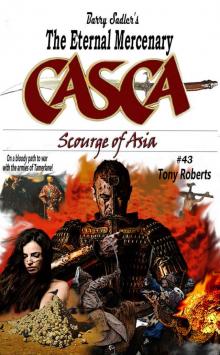 Casca 43: Scourge of Asia
Casca 43: Scourge of Asia The Lombard
The Lombard Casca 49: The Lombard
Casca 49: The Lombard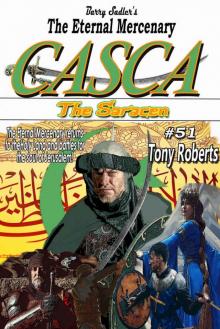 The Saracen
The Saracen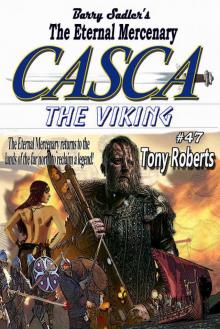 Casca 47: The Viking
Casca 47: The Viking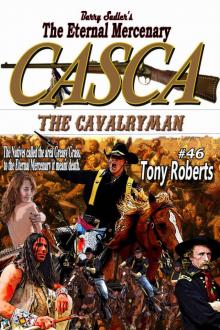 Casca 46: The Cavalryman
Casca 46: The Cavalryman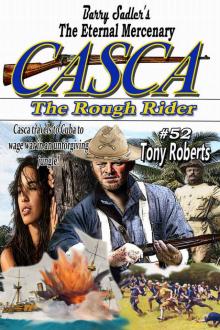 Casca 52- the Rough Rider
Casca 52- the Rough Rider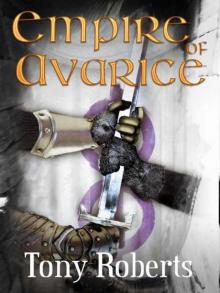 Empire of Avarice
Empire of Avarice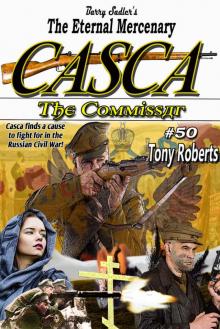 The Commissar
The Commissar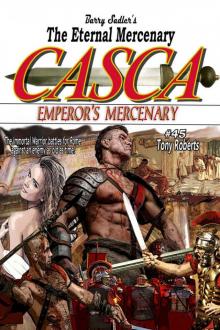 Casca 45: Emperor's Mercenary
Casca 45: Emperor's Mercenary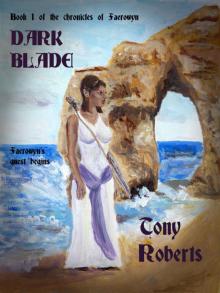 Dark Blade
Dark Blade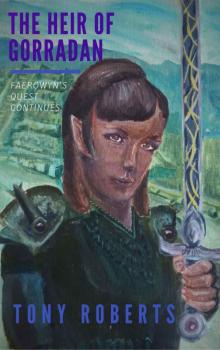 The Heir of Gorradan (Chronicles of Faerowyn Book 2)
The Heir of Gorradan (Chronicles of Faerowyn Book 2)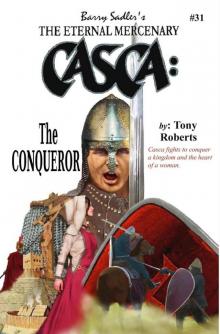 Casca 31: The Conqueror
Casca 31: The Conqueror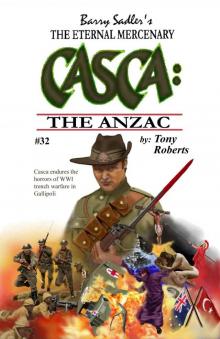 Casca 32: The Anzac
Casca 32: The Anzac The Anzac
The Anzac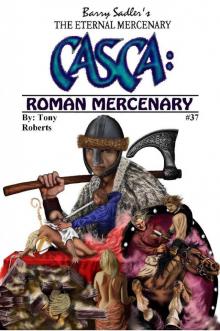 Casca 37: Roman Mercenary
Casca 37: Roman Mercenary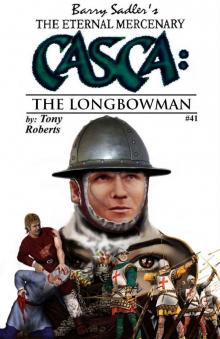 Casca 41: The Longbowman
Casca 41: The Longbowman The Longbowman
The Longbowman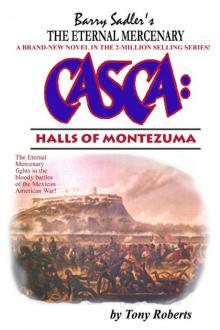 Casca 25: Halls of Montezuma
Casca 25: Halls of Montezuma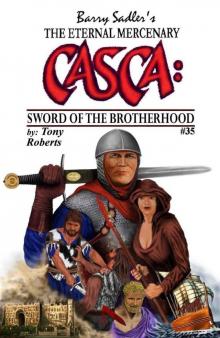 Sword of the Brotherhood
Sword of the Brotherhood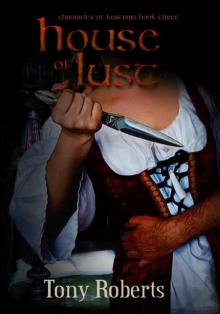 House of Lust
House of Lust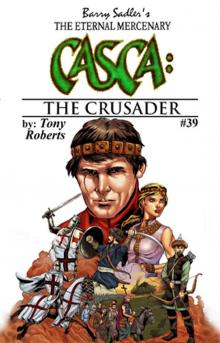 Casca 39 The Crusader
Casca 39 The Crusader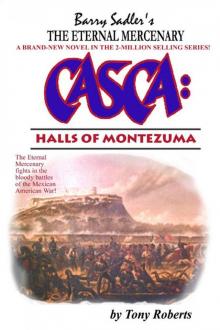 Halls of Montezuma
Halls of Montezuma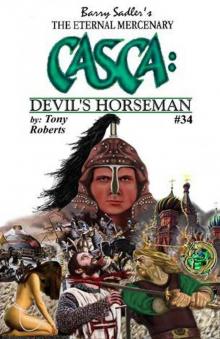 Devil's Horseman
Devil's Horseman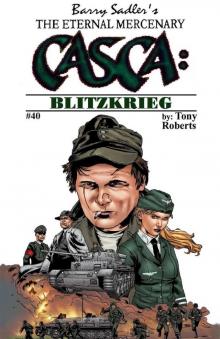 Casca 40: Blitzkrieg
Casca 40: Blitzkrieg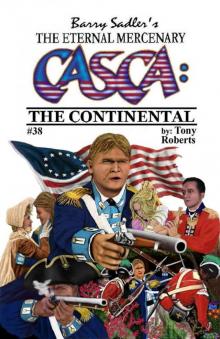 Casca 38: The Continental
Casca 38: The Continental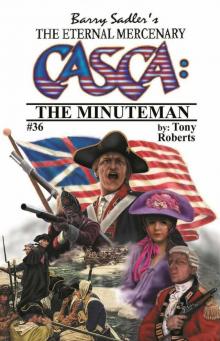 The Minuteman
The Minuteman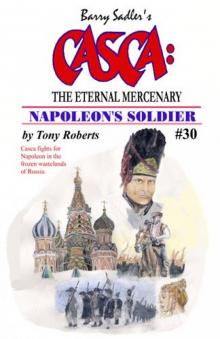 Napoleon's Soldier
Napoleon's Soldier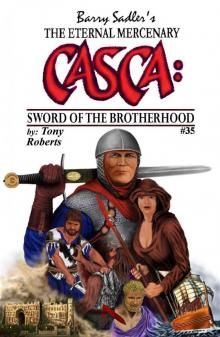 Casca 35: Sword of the Brotherhood
Casca 35: Sword of the Brotherhood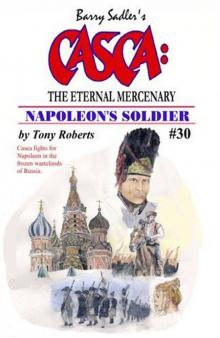 Casca 30: Napoleon's Soldier
Casca 30: Napoleon's Soldier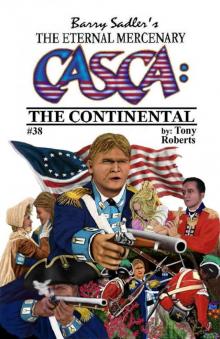 The Continental
The Continental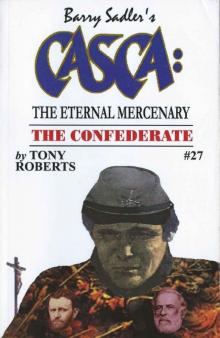 The Confederate
The Confederate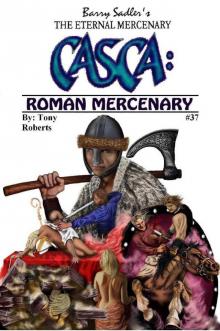 Roman Mercenary
Roman Mercenary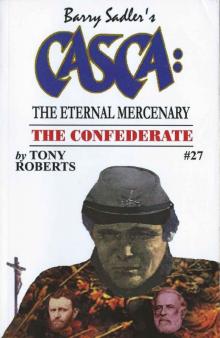 Casca 27: The Confederate
Casca 27: The Confederate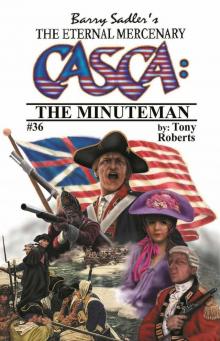 Casca 36: The Minuteman
Casca 36: The Minuteman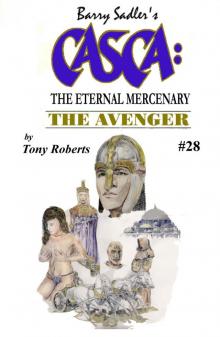 Casca 28: The Avenger
Casca 28: The Avenger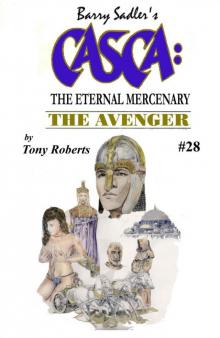 The Avenger
The Avenger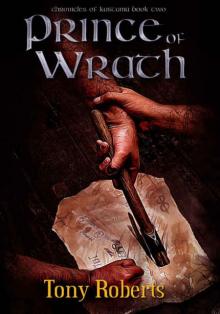 Prince of Wrath
Prince of Wrath